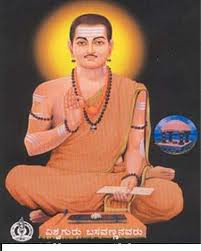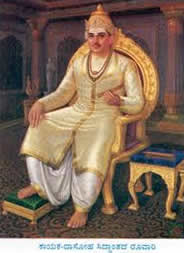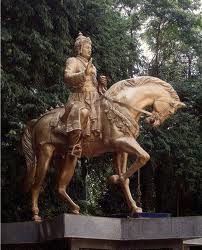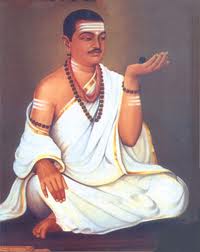BASAVA
Basava (also known as Guru Basavanna (Kannada) or Basaveshwara (Kannada), (1134–1196)) was a philosopher and a social reformer from India. He is also called Vishwa Guru and Bhakti-Bhandari. His teachings and preachings which are universal, go beyond all boundaries of belief systems. He was a great humanitarian and preached a new way of life wherein the divine experience being the center of life regardless of gender, belief, tradition, religion, caste, social status or whatever. The key aspect of his preaching is monotheistic concept of God. He was a true visionary with ideas ahead of his time; he envisioned a society that flourished enriching one and all. He was a great mystic of his time and originated a literary revolution through his literary creation called Vachana Sahitya. He was a mystic by temperament, an idealist by choice, a statesman by profession, (he was the Prime Minister of the Southern Kalachuri Empire in South India) a man of letters by taste, a humanist by sympathy, and a social reformer by conviction. Many great yogis and mystics of his time joined his movement enriching it with the essence of divine experience in the form of Vachanas (Lit. sayings - sacred hymns in Kannada)

Basava fought against the inhuman practice of caste system, which discriminates people based on their birth, and certain rituals in Hinduism. He spread social awareness through his poetry, popularly known as Vachanas. These are rational and progressive social thoughts coupled with established perception of God in Hindu society. Basava, like Gautama Buddha, did not preach people the intricate aspects of spirituality; but, he taught people how to live happily in a rational social order. His teachings later came to be known as Veerashaiva Dharma, Sampradaya or Lingavanta Dharma; which is also known as Lingayata. Other synonyms for lingayata are: Basava Dharma, Sharana Dharma, Vachana Dharma.

Basava said that the roots of social life are embedded not in the cream of the society but in the scum of the society. It is his witty saying that the cow does not give milk to him who sits on its back, but it gives milk to him who squats at its feet. The Anubhava Mantapa, an academy of mystics, philosophers and saints, established by Basava laid down the foundation of social democracy. Basava believed that man becomes great not by his birth but by his worth to the society. This means faith in the dignity of man and the belief that a common man is as good a part of society as a man of status.

He proclaimed that all members of the state are labourers: some may be intellectual labourers and others may be manual labourers. He placed practice before precept and his own life was en example of rectitude. Basava brought home to his countrymen the lesson of self-purification. He tried to raise the moral level of the public life in the country, and he insisted that the same rules of conduct applied to the administrators as to the individual members of the society. He also taught the dignity of manual labour by insisting on work as worship. Every kind of manual labour, which was looked down upon by people of high caste, should be looked upon with love and reverence, he argued. Thus arts and crafts flourished, and a new foundation was laid down in the history of the economics of the land.

Basava formed people's committees representing various vocations such as agriculture, horticulture, tailoring, weaving, dyeing, and carpentry. All vocations were regarded as of equal value and the members belonged to all sorts of vocations. Thus Jedara Dasimayya was a weaver, Shankar Dasimayya a tailor, Madivál Máchayya a washerman, Myadar Ketayya a basket-maker, Kinnari Bommayya a goldsmith, Vakkalmuddayya a farmer, Hadap Appanna a barber, Jedar Madanna a soldier, Ganada Kannappa an oilman, Dohar Kakkayya a tanner, Mydar Channayya a cobbler, and Ambigara Chowdayya a ferryman. There were women followers such as Satyakka, Ramavve, and Somavve with their respective vocations. The curious thing was that all these and many more have sung the Vachanas (sayings) regarding their vocations in a very suggestive imagery. |